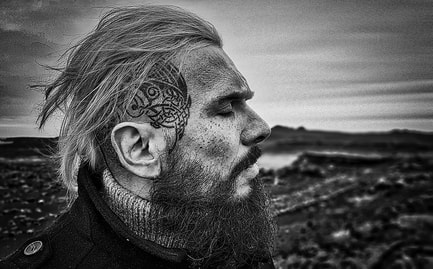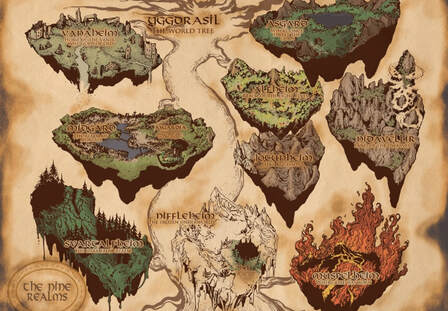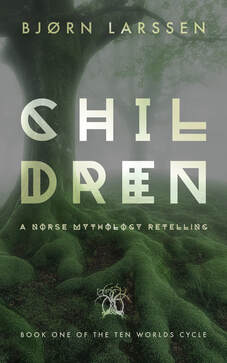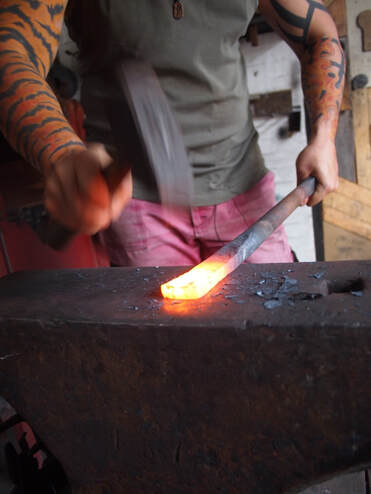|
Welcome Bjørn! Thanks for taking some time to chat about writing. First, a few quick-fire questions: What is your favourite kind of cheese? Do you prefer sailing or flying? And if you were to be thrown back in time to the Viking Age what would your weapon of choice be? Cheers Joshua, thanks for having me! Brie plays an important role in my life (oh great, just started salivating), but generally whatever it is they put on pizza is my favourite. So I suppose my favourite kind of cheese is “melted”. I have never had a chance to actually sail. I’ve been on a few moored ships, including Viking ones, but that’s not quite the same. In a few months I’ll have a chance to sail on a real Viking longship for actual research purposes, which is very exciting, but for now I have to go with flying. I’m immediately tempted to say “a hammer,” because that’s what I’m good with, but I don’t think it would be dangerous enough. Give me two throwing axes. "In a few months I’ll have a chance to sail on a real Viking longship for actual research purposes, which is very exciting, You and I have two rather peculiar things in common - one is a love of Viking lore and history and the other is a degree in mathematics! From one mathematical Viking nerd to another, what role do you see numbers playing in Norse mythology and which are the most significant? Three and nine – three times three. There are the Nine Worlds, three Norns take care of the passing of time, Odin was born with two brothers, and when he hung from Yggdrasil to discover the runes, it took him nine days and nine nights. The twenty-four runes are divided into three eights: Freyr’s aett, Hagal’s aett, Tyr’s aett. "There are the Nine Worlds, three Norns take care of the passing of time, Odin was born with two brothers, and when he hung from Yggdrasil to discover the runes, it took him nine days and nine nights." I often like to emphasize that the actual writing of a book is not usually the hardest part; the most difficult thing is actually getting yourself to sit down and write the damn thing. How do you keep yourself accountable and on track when it comes to your writing schedule? I’m disabled and my illness flares up randomly, which makes it impossible to have a schedule. When things are bad, I do very little – sometimes I can’t even read. Then, once I feel better, I decide that I have been magically cured and can go on working for twelve hours. A day later I am so exhausted that I write nothing. I don’t seem to learn from this, perhaps because I love what I do. So I get better again, reopen Scrivener and start again… then rest… then start again… until the book is ready decades later. Typo! Months. I totally meant months. Earlier this year your novel Children was released, the first book in the The Ten Worlds universe which draws heavily from the Norse Myths. The two main characters, Magni and Maya, are the offspring of well known Norse deities and must reckon with the many short-comings of their parents. What drew you to this theme of familial conflict and in what way did family culture of the Viking Age play into the narrative? I read an article about Paris Jackson, who might never get a chance to become more than “the daughter of”. And that was before Finding Neverland showed Michael Jackson in a very different light – now being “the daughter of” carries even more weight. And I thought – how does it feel to be a child of someone so famous that it’s hard to find a person who has never heard about him? When you meet somebody and their eyes light up, and you know it’s never because of you, but your father? "And I thought – how does it feel to be a child of someone so famous that it’s hard to find a person who has never heard about him?" Thor gets half the mythology for himself. He is possibly the best known and most amusing out of all the Norse deities. His son, Magni, only gets two mentions – once when he saves his father from a troll, then after Ragnarok, when he inherits Thor’s hammer. How does it feel to be “the son of” a God everyone knows and worships, while hardly anybody knows about your existence? When people only care for you because you can be a useful tool to get closer to your father – who doesn’t seem to even remember you exist? I didn’t actually try to recreate Viking Age families. I will have to for Land, the next instalment in the series and I’m already dreading it excited. In discussing your process for writing Children, you mentioned that you rewrote the story 29 times! How do you view the editing process in terms of its purpose and function? Do you have any techniques or strategies to ensure that each draft is better than the previous one? I don’t revise or edit in the “traditional” way – I rewrite the whole book over and over. I go through what I have written before, read it, then try to write it again, but better. Sometimes I will finish a part, then immediately go back to its beginning and start again. There are a few scenes in Children that I have rewritten 40-50 times, and I am still not happy with one of them. "It wasn’t until draft 28 that Maya revealed a crucial piece of information to me – she was claustrophobic from the beginning, but it took me 14 months to find out why." My characters tend to hide things from me for a long time. It wasn’t until draft 28 that Maya revealed a crucial piece of information to me – she was claustrophobic from the beginning, but it took me 14 months to find out why. That last moment scene is one of the strongest parts of the book. The whole story would have made much less sense if I stopped with draft 27. This is an unusual writing process and I wouldn’t recommend it to anyone. Any fantasy author would envy your work as a blacksmith. From your time at the forge, what do fantasy writers get wrong about this age-old trade and about weaponcraft in general? Are there any good online resources for those who want to learn more? People underestimate the amount of time it took to create, for instance, a chain maille vest when each of the tiny rings had to be made by hand, then woven with all the others. That’s why only the richest wore chain maille, while most people put on leather and prayed for luck. It’s similar with swords, especially elaborate ones – those things were worth a fortune, because they took so long to produce. And that’s not including many years of learning the craft before you knew how to do it. "People underestimate the amount of time it took to create, for instance, a chain maille vest when each of the tiny rings had to be made by hand, then woven with all the others." Forges are not hot places, unless it’s summer. The fire is not placed on the ground (nobody’s back would survive that), but elevated. In the winter your face will drip with sweat and your feet will be on the brink of frostbite. That one’s not a book, but I can’t believe none of the many great bladesmiths and blacksmiths who worked on Game of Thrones enlightened Gendry that the forge fire is there for a reason when, twice, he grabbed cold iron and began to hammer it. It took me zero minutes during my first class to understand you don’t do that. Can you give us any hints or clues about your next project? Are you continuing to write the The Ten Worlds universe or are you taking a break to write something else? The Norse Gods claimed all my writing time. I’m working on the sequel to Children, called Land, where some deities and their mortal BFFs go to Earth – the tenth world – to discover Iceland. At the same time I’m fiddling with a series of novellas, How to Be a God, humorous retellings of some myths I haven’t worked into The Ten Worlds yet. I’m not a fan of Neil Gaiman’s take on Norse mythology, so I’m writing what I want to read. Last, but certainly not least, where can readers find your books and keep track of your latest publications? The e-books are on Amazon and Kindle Unlimited. The dead tree versions, both paperbacks and hardcovers, are available everywhere – if your local bookstore happens to be open, you can order the book there, same as with libraries.
The best way to keep track with what I’m up to is to subscribe to my newsletter. I tried Instagram, but I just ended up following way too many bearded Vikings for, um, research purposes. I spend less and less time on Facebook, because their latest redesign is actively hostile towards the users. Instead I write 1000 words in Scrivener and 5000 words in my tweets.
1 Comment
|
AuthorJoshua Gillingham is an author, editor, and game designer from Vancouver Island, Canada. Archives
April 2022
Categories
All
|





 RSS Feed
RSS Feed
